Knowledge
Knowledge

In the Name of Allâh, the Most Beneficent, the Most Merciful
Sufyaan Ath-Thawree, raHimahullaah, said: "The excellence of knowledge is due only to the fact that it causes a person to fear and obey Allaah, otherwise it is just like anything else." [Related by ibn Rajab] Al-Hasan al-Basree, raHimahullaah, said: "Whoever learns something in the name of Allaah, seeking that which is with Him, he will win. And whoever learns something for other than Allaah, he will not reach the goal, nor will his acquired knowledge bring him closer to Allaah." [Related by Ibn ul Jawzee]
Ibn Mas`ood, raDiallaahu `anhu, said: "True knowledge is not measured in relationship to how much you memorize and then narrate, but rather, true knowledge is an expression of piety [protecting oneself from what Allaah prohibited and acting upon what He mandated]."Also, "Study and act upon what you learn." [Related by Abu Na`eem]
The Excellence of Knowledge
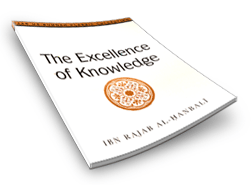
The Virtue of the Salaf Over the Khalaf (Ibn Rajab al-Hanbali). These are some brief words about the meaning of knowledge and its classification into that which is beneficial and that which is not; as well as a note regarding the excellence of the knowledge of the Salaf over that of the Khalaf. The way and wisdom of the Salaf, all goodness lies in traversing the way of the Salaf, beneficial Knowledge with regards the ‘Inner Sciences’, the foundation of knowledge and many other branches of the beneficial knowledge.
Purchase At Daar us-Sunnah
Provisions for the Hereafter (Zaad Al-Ma'ad)

by Ibn Al-Qayyim Al-Jawziyyah. Allah has sent the Messenger (S) with guidance and the Religion of Truth. Strict adherence to the guidance of His Prophet (S) is required from the followers of Islam. The scholars of the Islamic community have attached great importance to it and produced texts regarding the Acts of Worship, Dealings and Habits in the light of the Divine guidance. This book is one of the most famous works written on this subject. This book is one of the important resources of knowledge for those who seek to know the Seerah of their Prophet (PBUH) as well as, the Fiqh learned from it. This is a book that is unique in that it explains the Sunnah through the Seerah and the Seerah through the Sunnah.
- Download [15 MB]
Knowledge Mandates Action

Iqtidaa-ul-‘Ilm al-‘Amal By Al-Khateeb Al-Baghdaadee. This is the second book in the "Classical Knowledge Series", which is a collection of selected scholarly works from the past that deal with the subject of religious knowledge. The first book in this blessed series was “The Book of Knowledge” written by Imaam Abu Khaithamah Zuhayr bin Harb An-Nasaa’ee (Died 234H), may Allaah have mercy on him.
Since that book served as an introduction to knowledge, its virtues, merits and manners, it seemed proper that the second book be dedicated to the next level of knowledge, which is its result and outcome, and that is righteous deeds. And what better work to present on this subject than the classic and well-known treatise of the distinguished Imaam, Al-Khateeb Al-Baghdaadee, 'Iqtidaa-ul-‘Ilm al-‘Amal' (Knowledge Mandates Action).
In this treatise, the author gathers over 200 narrations from the Prophet, his Companions and the pious predecessors on the virtue and obligation of acting upon knowledge. Thus the work serves as an inspiration and encouragement to the readers, guiding them to transfer whatever knowledge they gain of Islaam into good deeds and righteous actions. You will find this book filled with beautiful admonitions and golden words of advice from our righteous predecessors, inciting us to acquire knowledge and to then put it into practice by way of acts of worship.
In addition to this, Shaikh Muhammad Naasir-ud-Deen Al-Albaanee, has reviewed the treatise and verified the narrations contained within it, distinguishing the authentic from the weak. So this treatise is of great benefit and deserving of being read and studied by every Muslim, whether in gatherings or individually.
Lastly, due to the nature of verifying narrations, many terms related to the Science of Hadeeth were employed by Imaam Al-Albaanee throughout the footnotes in the treatise. Explanations of these terms and concepts can be found in the Glossary section at the back of the book.
We ask Allaah to make this publication a guiding light to those who read it and an invaluable resource of reference for those who study it and use it for research.
The Etiquette of Seeking Knowledge
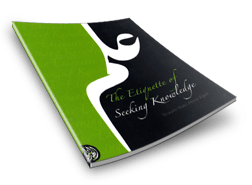
By: Shaykh Bakr Aboo Zayd. The Etiquette of Seeking Knowledge ... to adorn oneself with beautiful etiquette, noble manners, good behaviour, and pious conduct are distinguishing characteristics of the people of Islaam, and knowledge - the most precious pearl in the crown of the purified Shareeah - cannot be attained except by those who adorn themselves with its etiquette and those who leave evil qualities associated to it. For this reason the scholars devoted their attention to this etiquette, outlined its importance and wrote books solely on this topic; either pertaining to (general conduct] with all types of knowledge or to specific types of knowledge such as the etiquette of the carriers of the Noble Quireaan, the etiquette of the muhaddith, the etiquette of the muftee, the etiquette of the qaadee (judge), the etiquette of the muhtasib (the one who enjoins good and forbids evil for the sake of Allaah) and so on. The issue of this book is the general conduct of those who take the path of seeking the knowledge of the Sharee'ah.
The Manners of the Knowledge Seeker

By Abu 'Abdillah Muhammad Sa'id Raslan. Translated By Abu Sabaayaa.
“I spent thirty years learning manners, and I spent twenty years learning knowledge.” - ‘Abdullah bin al-Mubarak
1 Purify Your Intention for Allah in Seeking Knowledge
2 Purify Yourself Inwardly and Outwardly From That Which Contradicts the Shari’ah
3 Completely Free Your Heart for Knowledge and Remove All Obstacles
4 Eat Little, Be Cautious, and Constantly Remember Allah
5 Eat, Sleep, and Speak as Seldom as Possible
6 Reduce Socialization and Choose the Right Friends
7 Choose What to Start With and Who to Teach You
8 Have the Best Manners with Your Teacher
9 Treat Your Books Well
10 How to Act During a Lesson
Waswasah

The Interpretation of the book: 'Dham Al-Muwaswiseen wat-Tahdheer Minal Waswasah'. By Imam and Scholar Muwafaq Deen bin Qudaam al-Hanbali (ibn Qudamah al-Maqdisi al-Hanbali). Written by Imam Ibn Qayyim al-Juziyyah. Discussion of many related topics, such as: Niyyyah in taharah and salaah, Excessive use of water in wudu and bathing, Disregarding any waswasah about breaking wudu, Things that people are harsh in implementing, Carrying children during salah, Use of water left in open containers.
Mukhtasar Al-Quduri

An Introduction to Al-Mukhtasar. Perhaps al-Quduri's most famous work, Al-Mukhtasar is also known as al-Kitab. The number of issues it addresses is 12,500, spanning the entire spectrum of fiqh, for the book covers not only matters of worship, but also business transactions, personal relations and penal and judicial matters. Abu `Ali al-Shashi said about the book, "Whoever memorizes this book is the best accomplished of our associates in memorization, and whoever understands it is the best accomplished of our associates in understanding."
Elements Of Shafiee Fiqh

A breif summary of Shafiee Fiqh, the contents page reads as follows: Elements Of Islam, Islamic Laws, Taharah, Najasat, Istinja, Wudhoo, Ghusl, Tayammum, Naidh and Nifaas, Salaah, Arkaan-us-Salaah, Pre-Sunan of Salah...
Muslim International Law (Kitab al-Siyar al-Saghir)

By Imam Muhammad ibn al-Hasan Ash-Shaybani. Muslim International Law may be defined as: That part of the law and custom of the land and treaty obligations which a Muslim state observes in its dealings. Imam Muhammad ibn al-Hasan Ash-Shabani- was a pupil of Abu Hanifah and heard hadith from Mis'ar ibn Kidam, Sufyan ath-Thawri, 'Amr ibn Dinar, Malik ibn Maghul, Imam Malik ibn Anas (, al-Awza'i, Rabi'ah ibn Salih, Bakir and Qadi Abu Yusuf. He resided in Baghdad and narrated hadith there. He was Muhammad ibn al-Hasan ash-Shaybani His kunya was Abu 'Abdullah. He was born in 132 and died in 189 AH. He was only about eighteen years old when Abu Hanifa died and had not been with him for a long time, but nonetheless he compiled a more complete study of the fiqh of Iraq than Abu Yusuf. He took from ath-Thawri and al-Awza'i, and travelled to Malik and learned the fiqh of hadith, transmissions and the opinions of Malik, after having learned fiqh of opinion from the Iraqis. He stayed with Malik for three years. He was appointed a qadi under ar-Rashid but was never Chief Qadi. He had great skill in letters and so he had both linguistic training and analytic perception. He was concerned with his appearance so that ash-Shafi'i said about him, "Muhammad ibn al-Hasan fills both the eye and the heart." He also mentioned his great eloquence.
- Download [11 MB]

The Evolution of Fiqh (Islamic Law & The madh-abs)

By Dr Abu ameenah Bilal Philips. The origin of Islamic law and its evolution and the four schools of law (math-habs) are discussed in this work along with the reasons for differences among them. This is probably Bilal Philips best-selling work on the various schools of thought in Islam, including detailed facts, insight, and commentary on the four major madhabs as well as other, less-known madhabs in Islam. Includes mini-biographies on various eminent Islamic scholars the Evolution of Fiqh (Islamic Law & the Madh-habs), the author very clearly presents a brief overview of the historical development of Islamic law and its schools (the Madh-Nabs). The book identifies the main reason for the appearance of the Madh-habs and the factors leading to differences among them. For those to whom the Madh-habs have been a mystery, this aspect of the book will he extremely enlightening. Although the author sheds light on both the positive and negative roles of the Madh-habs in the past, the main message of the book is call to the understanding the differences (with an aim to remove them where possible)
The Legal Status of Following a Madhab

By Muhammed Taqi Usmani. The Nature of Taqleed, The Concept of Taqleed in the Qur'an Taqleed in the Sunnah, The Era of the Companions and Absolute Taqleed Taqleed of an Individual during the Time of the Companions and their Followers, The Need for Following a Particular Imam Taqleed of an Individual Why the Four Schools of Thought, The Different Levels of Taqleed, The Taqleed of the Lay Person, The Taqleed of an Expert Scholar, The Taqleed of a Scholar who is a Mujtahid in his School, The Taqleed of an Absolute Mujtahid, Responses to Doubts Raised Against Taqleed, The Following of Forefathers is Condemned in the Qur'an, The Condemnation of Taqleed of Savants and Sages, The Hadith of Adi ibn Hatim, Radi-Allahu anhu, The Statement of Abdullah ibn Mas'ood, Radi-Allahu anhu, The Statements of Mujtahid Imams Themselves, How Does a Lay Person Recognize a Mujtahid Is Taqleed a Defect?, The Taqleed of an Individual and Following one's Whims and Fancies, The Taqleed of an Individual and New Issues The Hanafi School of Thought and Ahadith Imam Abu Hanifa and his Knowledge of Hadith, Inertia in Taqleed
Code of Scholars : Usul al Fiqh Notes

Taught by Sheikh Yaser Birjas
Who has authority to give a fatwa? How can one Shaykh say something to be Haram while the other deems it permissible? In this seminar, students will learn about Islamic rulings and their method of deduction. They will learn such things as how legislation comes to be, how texts from the Qur'an and Sunnah are analyzed, and how apparently confusing verses are understood.
- Understanding Usool Al-Fiqh

- Al-Hukm Shar'ee (The Islamic Rule) 1

- Al-Hukm Shar'ee (The Islamic Rule) 2

- Al-Hukm Shar'ee (The Islamic Rule) 3

- The Sources of Islamic Law 1

- The Sources of Islamic Law 2

Forbidden
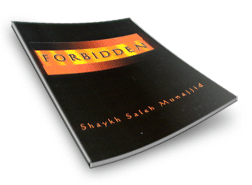
The Forbidden, Issues Of Great Importance That We Underestimate. Al-Muharramat (the forbidden) are the limits of Allaah (the Mighty and Magnificent). "These are the limits of Allaah, so do not approach them". . Allaah has threatened whoever transgresses His limits and violates His sacraments stating (Glorified be He): "And whoever disobeys Allaah and His messenger and transgresses His limits - He will put him into the fire to abide eternally therein, and he will have a humilating punishment." It is obligatory to avoid al-muharramaat in view of the saying of the prophet: "And whatever I forbade you, then avoid it and whatever I enjoined upon you, then fulfill as much of it as you able." I ask Allaah guidance, success, and observance of His limits for myself and for my Muslim brothers. I ak Him (Glorified be He) to help us avoid al-muharramaat and protect us from sins and evil deeds, Allaah is the best protector and He is the Most Merciful (Author)
A Collection of Knowledge and Wisdom
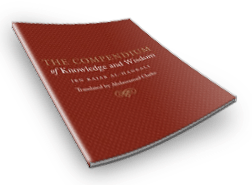
This is an English translation of Ibn Rajab al Hanbali's classic work Jami'al Ulum Wal Hikam. It is basically a listing of 50 ahadith (sayings of the Prophet), and along with them are comments, lessons to be learned from them, and sayings of the Sahaba regarding them.
- Download ( 28 MB)

Advice To The Seekers of Knowledge
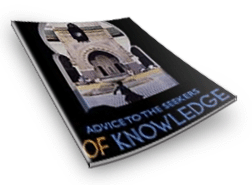
By Shaykh Sultan Al Utaybi. Part of a series of writings advising the Talib ul Ilm (student of knowledge).
 Islamic Books,
Islamic Teachings,
Kalamullah,
Knowledge
Islamic Books,
Islamic Teachings,
Kalamullah,
Knowledge
This entry was posted on Sunday, October 18, 2009 , 7:34 AM. You can follow any responses to this entry through the RSS 2.0 feed. or you can leave your own response below.

 or
or 







